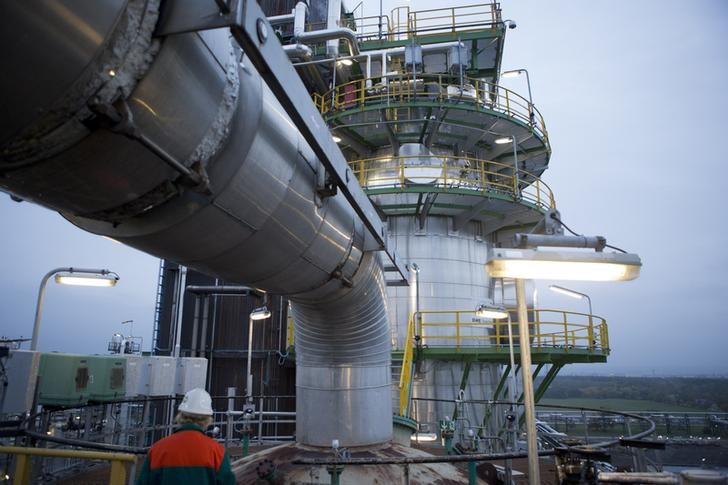By Henning Gloystein
SINGAPORE, March 14 (Reuters) - Oil prices were stable in
early trading on Monday, with global oversupply and slowing
economic growth weighing on markets but prospects of falling
production lending crude some support.
U.S. West Texas Intermediate (WTI) crude futures CLc1 were
trading at $38.36 per barrel at 0055 GMT, down 14 cents from
their last settlement, but international benchmark Brent futures
LCOc1 were up 3 cents at $40.42 a barrel.
Morgan Stanley (NYSE:MS) said that oil prices had likely bottomed out,
but warned that a slowdown in economic growth and high
production would prevent sharp rises.
"Oil prices now seem to have bottomed, even though they are
likely to stay subdued for the rest of this year before starting
to move higher in 2017," the U.S. bank said.
Morgan Stanley also said that cheap oil had not provided the
economic boost to growth that many had hoped for.
"When oil prices are falling below production costs, the
income gains for consumers will be smaller than the costs to
producers and falling oil prices become a negative-sum game," it
said.
For 2016, the bank said it was "no longer looking for an
acceleration in 2016 GDP growth" and that the risk of a global
recession was now 30 percent.
Following a 70 percent price rout between mid-2014 and early
2016, oil markets are in flux.
Many analysts expect a modest price recovery.
The International Energy Agency (IEA) on Friday said that
oil prices had likely bottomed out due to output cuts in the
United States and other producers outside the Middle
East-dominated Organization of the Petroleum Exporting Countries
(OPEC).
Yet others warn that global overproduction - which sees over
1 million barrels of crude produced in excess of demand every
day, leaving storage tanks filled to the rims with unsold fuel -
will pull prices back down again just as it happened after a
short rally in early 2015.
In parallel to the IEA's announcement of recovering markets,
Goldman Sachs (NYSE:GS) said that the recent crude price rally was
premature and that prices could fall sharply in coming weeks,
pulled down by record U.S. inventory builds.
- English (USA)
- English (UK)
- English (India)
- English (Australia)
- English (South Africa)
- English (Philippines)
- English (Nigeria)
- Deutsch
- Español (España)
- Español (México)
- Français
- Italiano
- Nederlands
- Português (Portugal)
- Polski
- Português (Brasil)
- Русский
- Türkçe
- العربية
- Ελληνικά
- Svenska
- Suomi
- עברית
- 日本語
- 한국어
- 简体中文
- 繁體中文
- Bahasa Indonesia
- Bahasa Melayu
- ไทย
- Tiếng Việt
- हिंदी
Oil prices stable as market seen bottoming, but oversupply lingers
Published 2016-03-13, 08:59 p/m
Oil prices stable as market seen bottoming, but oversupply lingers

Latest comments
Install Our App
Risk Disclosure: Trading in financial instruments and/or cryptocurrencies involves high risks including the risk of losing some, or all, of your investment amount, and may not be suitable for all investors. Prices of cryptocurrencies are extremely volatile and may be affected by external factors such as financial, regulatory or political events. Trading on margin increases the financial risks.
Before deciding to trade in financial instrument or cryptocurrencies you should be fully informed of the risks and costs associated with trading the financial markets, carefully consider your investment objectives, level of experience, and risk appetite, and seek professional advice where needed.
Fusion Media would like to remind you that the data contained in this website is not necessarily real-time nor accurate. The data and prices on the website are not necessarily provided by any market or exchange, but may be provided by market makers, and so prices may not be accurate and may differ from the actual price at any given market, meaning prices are indicative and not appropriate for trading purposes. Fusion Media and any provider of the data contained in this website will not accept liability for any loss or damage as a result of your trading, or your reliance on the information contained within this website.
It is prohibited to use, store, reproduce, display, modify, transmit or distribute the data contained in this website without the explicit prior written permission of Fusion Media and/or the data provider. All intellectual property rights are reserved by the providers and/or the exchange providing the data contained in this website.
Fusion Media may be compensated by the advertisers that appear on the website, based on your interaction with the advertisements or advertisers.
Before deciding to trade in financial instrument or cryptocurrencies you should be fully informed of the risks and costs associated with trading the financial markets, carefully consider your investment objectives, level of experience, and risk appetite, and seek professional advice where needed.
Fusion Media would like to remind you that the data contained in this website is not necessarily real-time nor accurate. The data and prices on the website are not necessarily provided by any market or exchange, but may be provided by market makers, and so prices may not be accurate and may differ from the actual price at any given market, meaning prices are indicative and not appropriate for trading purposes. Fusion Media and any provider of the data contained in this website will not accept liability for any loss or damage as a result of your trading, or your reliance on the information contained within this website.
It is prohibited to use, store, reproduce, display, modify, transmit or distribute the data contained in this website without the explicit prior written permission of Fusion Media and/or the data provider. All intellectual property rights are reserved by the providers and/or the exchange providing the data contained in this website.
Fusion Media may be compensated by the advertisers that appear on the website, based on your interaction with the advertisements or advertisers.
© 2007-2024 - Fusion Media Limited. All Rights Reserved.